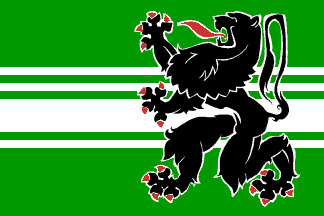

Last modified: 2009-01-17 by ivan sache
Keywords: flanders | lion (black) | east flanders | oost-vlaanderen | flandre orientale | proposal | governor |
Links: FOTW homepage |
search |
disclaimer and copyright |
write us |
mirrors
Flag of the Province of East Flanders - Image by Mark Sensen, 19 April 2001
See also:
The flag and arms of the Province of East Flanders were imposed on 14 December 1998 by Decree of the Flemish Minister of Culture, Family and Welfare, published in the Belgian official gazette on 14 April 1999.
The official description of the flag is:
"Three stripes with proportions 5:6:5, the upper and lower stripes
green, the middle stripe alternate white and green with proportions
1:1:1:1:4:1:1, in the fly a black lion with red nails and
tongue."
The Appendix to the Decree has images of the coat of arms and flag.
In the original drawing the lion had three nails at each claw, which was rejected. The original artist refused to change this to four nails, so another artist had to be found to make a new drawing. In this new drawing the lion is less modern than in the original one. Michel Lupant reports that the rejected flag was used unofficially, and that someone has seen a square version of it.
Mark Sensen, 29 May 1999
According to the provincial website, the green colour denotes the increasing concern for the environment, whereas the four white lines represent the rivers that cross the province, the thickest line representing the Scheldt (Schelde/Escaut) and the other ones the Leie (Lys), the Dender (Dendre) and the Durme.
Jan Mertens, 18 November 2005
Rejected proposal of provincial flag - Image by Jaume Ollé, 19 April 2001
The proposal adopted by the Provincial Council was rejected by
the Flemish Heraldic Council on 21 March 1996 because the lion had only
three nails to each paw. A standard heraldic lion should have four
nails, but there are exceptions to the rule; for example, on the greater coat of arms of Bavaria, the Palatine
lion has three nails, so have the Swabians leopards, as well as some
of the supporters of the shield.
Were these three nails actually the reason for the rejection of the proposed emblems by the Flemish authorities? Another reason may have been the very stylized drawing of the lion, as opposed to the heraldical lions in the otherFlemish provinces.
Anyway, though the flag was never officially recognized, it has
been produced by Flemish flag manufacturers, but ... with a
four-nailed lion, as could be seen in the town of
Bruges
(West Flanders).
The rejected proposals of flag and coat of arms were drawn by the
heraldist and painter Fernand Brose, who had already drawn the flag
and the coat of arms of the Belgian German-speaking Community.
Pascal Vagnat, 4 January 1999
Unofficial flag of East Flanders - Image by Geraard van der Vaart, 19 April 2001
The traditional banner of arms of Flanders ("Or a lion sable armed and langued gules") is used as the unofficial flag of East Flanders.
Ivan Sache, 3 February 2007
Unofficial colours of East Flanders - Images by Mark Sensen, 27 January 2001
The Province of East Flanders used, unofficially, colours taken from the arms. These colours were not fixed.
A chart called Vlaggen der Belgische Provincies - Drapeaux des Provinces Belges (Flags of the Belgian Provinces; not dated, but to judge from the font type used, from the 1920s-1930s) shows a flag horizontally divided black-yellow.
Some Dutch atlases and books about the provinces show another design, published by Rudi Koot in Vexilla Nostra [vxn]#185 (1993) p. 32-33, as horizontally divided yellow-black.
Mark Sensen, 6 February 2001
Honorary flag of the Governor of East Flanders - Image by Mark Sensen, 27 January 2001
The honorary flags of the Province Governors were adopted by Council Order on 28 October 1936. They are shown with construction details on a book (bilingual Dutch and French) containing regulations (for the Navy?). Each flag is a square version of the Belgian national flag with the respective province arms in the center of the black stripe. The flag is 150 x 150 cm, therefore each stripe is 50 cm in width. The shield is 43.5 cm in width and 50 cm in height, excluding 3.75 cm for the point of the shield.
Mark Sensen, 27 January 2001